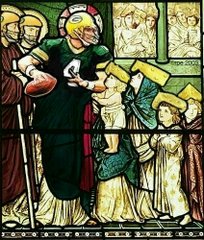"I believe in one holy catholic and apostolic Church." -- Nicene Creed, Third Article
"Someone perhaps will ask, 'Since the canon of Scripture is complete, and sufficient of itself for everything, and more than sufficient, what need is there to join with it the authority of the Church's interpretation?' For this reason--because, owing to the depth of Holy Scripture, all do not accept it in one and the same sense, but one understands its words in one way, another in another, so that it seems to be capable of as many interpretations as there are interpreters. . . .
"Moreover, in the catholic Church itself, all possible care must be taken that we hold that faith which has been believed everywhere, always, by all. For that is truly and in the strictest sense 'catholic,' which, as the name itself and the reason of the thing declare, comprehends all universally. This rule we shall observe if we follow universality, antiquity, consent. We shall follow universality if we confess that one faith to be true, which the whole Church throughout the world confesses; antiquity, if we in no wise depart from those interpretations which it is manifest were notoriously held by our holy ancestors and fathers; consent, in like manner, if in antiquity itself we adhere to the consentient definitions and determinations of all, or at the least of almost all priests and doctors.
"What, then, will a catholic Christian do if a small portion of the Church have cut itself off from the communion of the universal faith? What, surely, but prefer the soundness of the whole body to the unsoundness of a pestilent and corrupt member? What, if some novel contagion seek to infect not merely an insignificant portion of the Church, but the whole? Then it will be his care to cleave to antiquity, which at this day cannot possibly be seduced by any fraud of novelty." -- St. Vincent of Lerins, "Treasury of Daily Prayer," CPH, p. 1160.
According to Wikipedia, http://en.wikipedia.org/wiki/Vincent_of_L%C3%A9rins:
Saint Vincent of Lérins (died c. 445) (in Latin, Vincentius) was a Gallic author of early Christian writings.







No comments:
Post a Comment